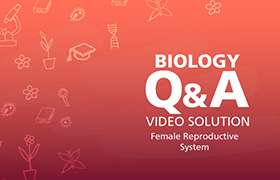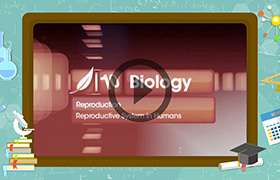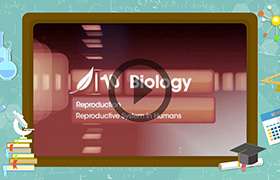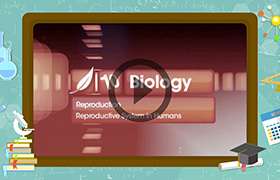CBSE Class 10 Answered
Human reproduction system
Asked by ronakjha1191 | 14 Feb, 2019, 11:07: AM
Male Reproductive System:
1. Testes (Testicles):
- Pair of testes is located below the abdomen in scrotal sac or scrotum.
- Testes produce male gametes sperms (germ cells).
- Sperms can withstand with the lower temperature.
- To maintain the temperature 2 – 3 0C lower than the body, scrotum is located outside the body cavity.
2. Epididymis:
- Tubes present in testes join to form epididymis.
- Epididymis stores sperms temporarily.
3. Vas deferens (sperm duct):
- Each epididymis continues further as sperm duct or vas deferens.
- Each vas deferens unites with a tube coming from the urinary bladder on either side.
- Thus, urethra is the common passage for sperms and urine.
4. Seminal Vesicles:
- A pair of glands.
- Each gland opens into the corresponding sperm duct.
- Seminal vesicle produces secretion which is responsible for the transportation of sperms.
5. Prostate gland:
- It is bilobed structure which surrounds the urethra.
- It pours an alkaline secretion into the semen.
6. Cowper’s gland:
- These are two small ovoid glands.
- They open into urethra.
- Its secretion serves as a lubricant.
7. Penis:
- The urethra passes through the penis.
- It carries either urine or semen at a time.
Female Reproductive System:
1. OVARIES:
- Two ovaries present in the pelvic cavity, one each side of the uterus.
- Ovaries produce ova which are female gametes.
- One ovum is released by one ovary every month.
- Ovaries also secrete female hormones oestrogen and progesterone.
- Both the hormones are responsible for the changes in female body at the time of puberty.
2. OVIDUCTS (Fallopian tube):
- The two oviducts or fallopian tubes are present. Each close to one ovary of its side.
- The end of the oviduct is broad and has many finger-like projections.
- When the egg is released by the ovary it passes down to the uterus through the oviduct.
3. UTERUS (Womb):
- Hollow pear-shaped, muscular organ.
- The inner lining of the uterus called endothelium protects and nourishes the developing embryo.
4. VAGINA (Birth Canal):
- Uterus opens into the vagina.
- Vagina is a muscular, narrow tube.
5. VULVA:
- Vagina and urethra both open into the vulva.
Answered by Sivanand Patnaik | 15 Feb, 2019, 09:54: AM
Application Videos
Concept Videos
CBSE 10 - Biology
Asked by ranveer989singh | 01 Jul, 2021, 08:25: AM
CBSE 10 - Biology
Asked by nehchalrs15 | 14 Oct, 2020, 09:38: PM
CBSE 10 - Biology
Asked by arindeep.singh | 10 Sep, 2020, 10:06: PM
CBSE 10 - Biology
Asked by malkabaswaraj | 29 Mar, 2020, 10:16: AM
CBSE 10 - Biology
Asked by sheetal2001p | 16 Sep, 2019, 07:27: PM
CBSE 10 - Biology
Asked by thepig783 | 01 Sep, 2019, 11:26: AM
CBSE 10 - Biology
Asked by agraharianiruddha | 26 Feb, 2019, 01:22: PM
CBSE 10 - Biology
Asked by ronakjha1191 | 14 Feb, 2019, 11:07: AM
CBSE 10 - Biology
Asked by minisureshmenon | 03 Feb, 2019, 12:30: PM
CBSE 10 - Biology
Asked by nehaa.k.9765 | 30 Jan, 2019, 10:07: AM






